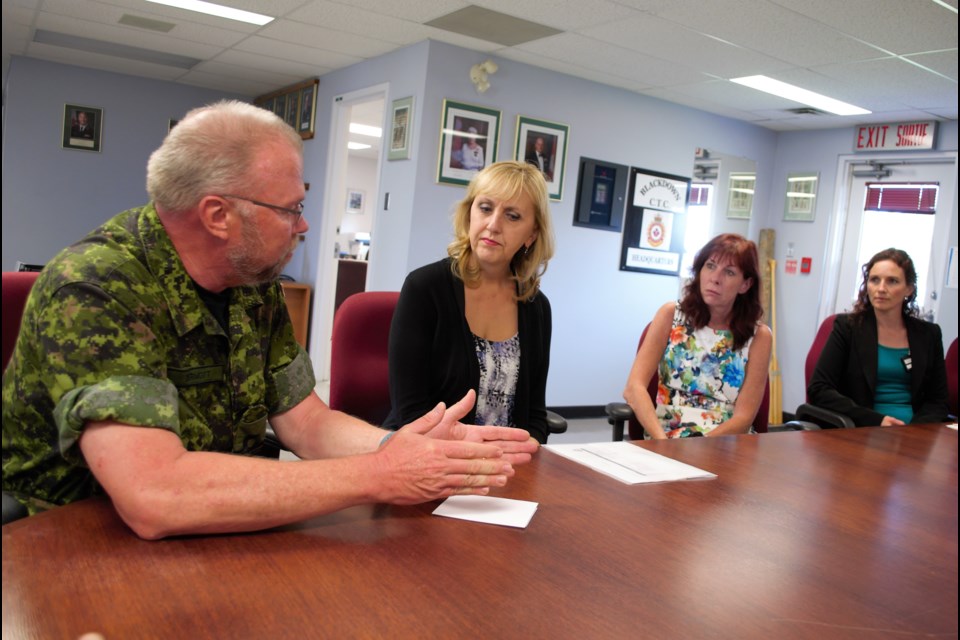CFB BORDEN -- Senior Royal Victoria Regional Health Centre (RVH) staff made the trek to Base Borden on Monday to visit Camp Blackdown to explore the campus, culminating in a visit to their on-site medical facilities.
“We really rely on community partnerships, especially in Barrie, to provide a variety of services,” said Lt. (Navy) Stephen Lasalle.
Lasalle says the partnership is important because while Camp Blackdown has a small medical clinic on site to deal with minor injuries and illnesses, if a cadet had to deal with a more serious issue, they would be transported to RVH.
“By having RVH come out, they become more aware of what we’re doing down here and have that awareness of the program,” said Lasalle. “This way, the cadets can receive the timely care that they need.”
Nancy Savage, executive vice president of patient and family experience, Melody Boyd, operations director for the mental health program and Heather Cochrane, manager of child and youth mental health at RVH all attended the tour of the Camp Blackdown facilities.
Lt.-Col. Allan Boileau greeted the RVH senior staff upon their arrival and gave an overview of the camp and the medical challenges associated with it.
Sea, air and army cadets have gathered at the Blackdown Cadet Training Centre at CFB Borden, located west of Barrie, to run through a myriad of challenging training opportunities throughout the summer. Blackdown is the largest of 22 cadet summer camps across the country, seeing about 3,500 cadets over the course of the summer. There is no cost to cadets for the camp.
“Most of the injuries we see here are through our sports and fitness. What we’re seeing more of now is the mental health issues,” said Boileau. “The medical portion is a pretty big portion for us. Because we live in a communal environment, if we do get an outbreak, it can go through the camp like wildfire.”
The tour started with a visit to one of the tents used as sleeping quarters, moving on to the band building where cadets can learn drumming, piping, as well as highland dance.
After that, the group worked their way toward the medical building, where they toured the triage area as well as various office and storage spaces, which was roughly the size of a walk-in clinic.
After the tour, Savage expressed gratitude for being given the chance to see the facilities.
“We’ve had the pleasure of having members of Base Borden come to RVH several times to look for opportunities where we can work together,” said Savage. “It was always meant to be a reciprocal thing. From our perspective, I always think it’s important to know who our neighbours are, and to be in a state of readiness should they need us.”
Savage sees the influx of youth that flock to the camp annually as enough of a reason to push forward with the partnership.
“There are so many young people who come in the summertime. The population of cadets surges, and there could be any number of reasons they could need to avail of any of our services,” she said. “I’ve never been here before so I had no assumptions, except with the expectation that, I thought this would be highly efficient and well organized. I was not surprised at all by the sense of pride that the organization has for the work they do.”
Savage says that while RVH regularly sees patients coming in from smaller centres, they don’t always know what happens to patients after they leave.
“We do receive patients from many smaller centres of varying capacity, and then we send them back but we don’t always know the resources that are at the other end. For me, I love having that visualization,” said Savage. “It’s part of a continuum of care.”
Maj. Wayne Willcott pointed to services RVH has provided that have really helped over the past year in being able to provide medical care to cadets.
“We’ve had expedited access to certain tests we need, such as MRIs and CT (scans), for example,” said Willcott. “Our system is built on the fact that we have these partnerships.”

